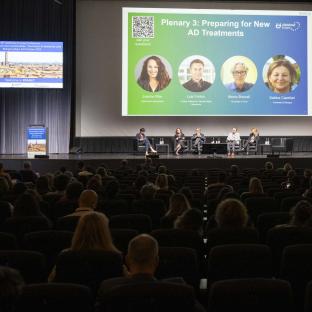Bologna, 8 October 2025 – The second day of the 35th Alzheimer Europe Conference (#35AEC) “Connecting Science and Communities: The future of dementia care” took place yesterday, 7 October 2025, with the programme focusing on gender and sexuality in dementia care, on diagnosing Alzheimer’s disease and on preparing for new treatments.
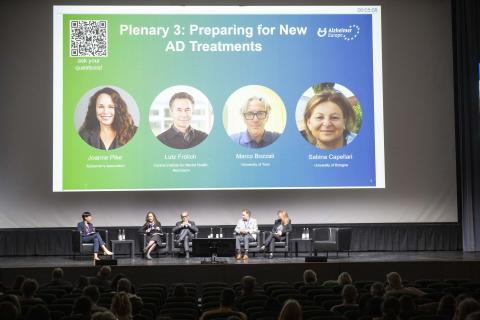
Gender and sexuality in dementia care
The second plenary of the conference explored themes around gender and sexuality in dementia care and was moderated by Marjolein de Vugt (Netherlands).
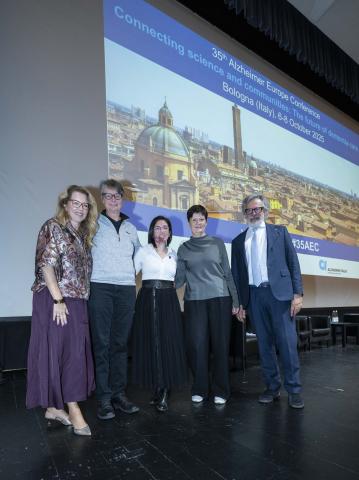
Maria Teresa Ferretti gave a talk on “Sex and gender differences in Alzheimer’s research”. Both sex (biology) and gender (socioeconomic factors) impact the clinical manifestation of Alzheimer’s disease, with women overwhelmingly affected, she said, highlighting that, in addition to being 2/3 of individuals living with the disease, women present higher accumulation of tau pathology and specific risk profiles.
“The current ‘one-size-fits-all’ approach in neurology fails to address patient-specific needs related to sex and gender, and in particular those from LGBTQI+ minorities. A precision-medicine approach is needed to ensure health equity in Alzheimer’s”, she insisted.
She also stated that, according to a recent survey from the EAN (European Academy of Neurology) coordinating panel on Diversity Equity and Inclusion, the majority of European neurologists feel they have not received sufficient training to treat patients belonging to the LGBTQI+ community and that they would welcome further education in this area.
The next speaker was Ingrid Hellström, who discussed “Gender in caregiving – barriers for male carers of people with dementia”. Male carers remain invisible despite growing numbers, she stated, with many male spousal carers struggling with stigma and identity shifts, feeling unseen in research, policy, and everyday support systems.
“They face unique, gender-shaped barriers”, she said, such as cultural expectations of masculinity which discourage men from seeking help. “They often lack information about available services, feel isolated in female-dominated spaces, and may view care mainly as a set of tasks rather than an emotional role”, she continued, stressing that “inclusive, gender-sensitive support is essential”. To truly meet their needs, she pointed to the importance of services, which need to adapt, providing practical, tailored, and emotionally aware interventions that respect men’s experiences as carers. “Recognising and supporting men is not only about fairness, but about ensuring all carers receive the right help at the right time”, she concluded.
The third speaker at this session was Martina Roes, whose talk was titled “To better understand the experiences and unmet needs of LGBTQ+ people with dementia within the health care system - preliminary results from an intersectional analysis”.
She began by saying that, whilst the number of people living with dementia is increasing, worldwide, there is limited research which has explored the experiences and unmet needs of LGBTQ+ people with dementia within the health care system, especially within dementia care. Her presentation shared combined results from three different reviews (one from the JPND-funded INTEREST project, one from an INTERDEM taskforce on Culture, content, and intersectionality, and a recently published article on needs, preferences, and experiences of LGBTQ+ people).
Preliminary results from these reviews show that LGBTQ+ people with dementia experience lifetime discrimination and stigma, giving them the impression of being ‘doubly invisible, which continues when they access the healthcare system, often losing their social support within their family of origin and relying on support from their ‘chosen family’. Fear of discrimination may compound this, leading them not to use healthcare services and to conceal their identities in a care setting, due to experiencing a lack of LGBTQ+ affirmative care because of heteronormative care approaches. She also noted that transgender and non-binary people with dementia face different challenges, such as inappropriate curiosity from staff or ignorance of their specific needs, putting them at greater risk of poor health.
Based on these results, some key needs were identified, including feeling safe to disclose and express one’s identity; receiving LGBTQ+ affirmative care; acceptance and inclusion of chosen family members; and overcoming structural barriers to access and utilise care services.
The final speaker was Diego De Leo whose presentation was titled “Gender as a factor in mental health and depression in old age care” and looked at how gender plays a significant role in shaping mental health outcomes and experiences of depression among older adults receiving care. Research indicates that older women are more likely to report symptoms of depression, he said, while older men may underreport due to social stigma and gender norms. He also pointed out that differences in life expectancy, caregiving roles, social support networks, and access to health services contribute to gender disparities in mental health. Understanding these gender-specific dynamics, he stressed, is essential for developing tailored interventions, improving diagnostic practices, and ensuring equitable care in geriatric mental health services.
After the plenary, delegates were able to view poster presentations, exhibited in the Ex-GAM Foyer (floors 1 and 2), and to speak to poster presenters about their research.
Parallel sessions and special symposia
Eleven parallel sessions followed, including two in Italian – one hosted by Alzheimer Uniti Italia and one by Federazione Alzheimer Italia. Other sessions included “Minority ethnic groups”, “Public involvement” (a series of Quick Oral Presentations, moderated by Ana Diaz, Public Involvement Lead), “Detection & diagnosis”, “Consent, legal capacity & decision making”, “Day care”, “Psychosocial interventions” and “Vascular dementia”. A session on “Impactful communication facilitating collaboration: Lessons-learned across career stages” was organised by INTERDEM, and the remaining session was sponsored by Combidiag.
After a short break, three special symposia took place simultaneously. One of these was on “Translating innovation into improved Alzheimer’s care” and was organised by our Gold sponsor Lilly. Jean Georges, Executive Director of Alzheimer Europe was one of the speakers at this session, taking part in a roundtable discussion. Another symposium was called “Research and co-creation: from tokenism to meaningful engagement” and was organised by Dutch project DEMPACT, whilst the third was organised by Fondation Médéric Alzheimer and was called “Alzheimer's co-housing, Another solution? - An alternative to the ambivalent choice between home care and nursing home”.
After a lunch break, eleven further parallel sessions were held, including two from our Italian co-hosts, Federazione Alzheimer Italia and Alzheimer Uniti Italia. Other parallel sessions included “Minority ethnic groups II”, “Brain health and prevention” (a series of Quick Oral Presentations, moderated by Lukas Duffner, Project Officer), “Public involvement in dementia research” (moderated by Soraya Moradi-Bachiller, Public Involvement Officer), “National Alzheimer's associations”, “Residential care II”, “Telehealth & remote care”, “Lewy-body dementia” (moderated by Kevin Quaid, Chair of the European Working Group of People with Dementia). There were also two sponsored sessions, one by YOD Included, focusing on “Diagnosis and post-diagnostic care in young-onset dementia” and the other called “Towards Inclusive Dementia Care: Policy, Practice, and Research Innovations”, hosted by the INTEREST project.
After these parallel sessions, delegates were able to view poster presentations, exhibited in the Ex-GAM Foyer (floors 1 and 2), and to speak to poster presenters about their research.
Later on, at the end of the second day of #35AEC, four further symposia were organised, one of which celebrated INTERDEM’s 25th Anniversary; another, called “Early action for dementia: A non-pharmacological person-centred model for cognitive intervention” was organised by Fundació Catalunya La Pedrera; a third, looked at “Advancing advocacy: from discovery to delivery in prevention and treatment” and was organised by the World Dementia Council in partnership with Alzheimer's Association; meanwhile, the fourth session was hosted by the Dutch ABORAD project and examined ways of accelerating Alzheimer’s research through real-world data capture and registry linkage.
Translating innovation into improved Alzheimer’s care
Special Symposium 1, “Translating innovation into improved Alzheimer’s care”, organised by gold- sponsor Lilly, was an immersive symposium that invited participants to ‘walk in the shoes’ of those shaping the future of dementia care. It opened with the screening of a moving video, called “Hero”.
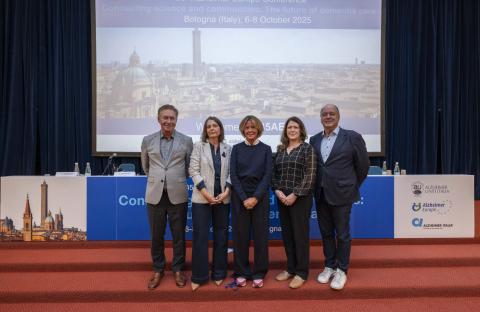
The session, led by scientific journalist Elena Meli (Italy), aimed to shine a spotlight on the powerful intersection of scientific innovation and community engagement, focusing on one of the most pressing challenges in Alzheimer’s disease (AD): achieving a timely and accurate diagnosis.
A panel of experts, including Catherine Reed, Senior Director, International Values, Evidence and Outcomes, Eli Lilly and Company, Lutz Frölich, Head of the Department of Geriatric Psychiatry, Central Institute for Mental Health, Mannheim (Germany), and Jean Georges, Executive Director, Alzheimer Europe took part in a roundtable discussion exploring how decades of research are now converging into transformative diagnostic and therapeutic innovations. With the potential to modify the course of AD on the horizon, time is of the essence, to ensure early and accurate diagnosis, as well as timely intervention, when they can make the biggest difference.
The symposium included segment called “Gamification: Put yourself in a policy makers’ shoes: Where would you invest to advance the health care system?” which gave delegates an idea how prioritising and financing different aspects of the dementia health environment impacts on outcomes.
The symposium was closed by Senator Beatrice Lorenzin, former Italian Health Minister who gave an update on Italian actions on dementia emphasising the need both for a long term strategy addressing all societal issues important to people with dementia and a more short-term framework to improve timely diagnosis and preparing the access to new innovative treatments. She also called for the development of a European Alzheimer’s strategy and the importance of fully involving people with dementia in policy planning.
Senator Lorenzin stated: “A strong collaboration between institutions, patients, and their associations is essential to transform real needs into concrete public health policies, and international opportunities for dialogue such as the Alzheimer Europe Conference move precisely in this direction.
As the Parliamentary Intergroup on Neurosciences and Alzheimer’s, we are working to ensure that therapies capable of slowing cognitive decline for defined groups of patients reach them in the shortest possible time.
For this reason, a shared commitment, both national and European, is extremely necessary to achieve the definition of a European Plan for Alzheimer’s and Dementia, based on equity, access to innovation, and mutual support among countries.”
The great debate in diagnosing Alzheimer’s disease: More than just a β test
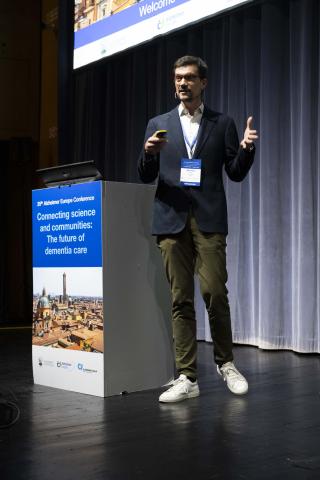
The afternoon plenary session began at 15.45, with, a keynote lecture titled “The great debate in diagnosing Alzheimer’s disease: More than just a β test”, delivered by Nicolas Villain. He emphasised that prognosis in cognitively unimpaired biomarker-positive individuals is heterogeneous, noting that most remain asymptomatic for years, whereas those with extended tau neuropathological changes in the neocortex confer very high short-term risk (~80% to mild cognitive impairment by six years; ~46% to dementia).
“Alzheimer’s disease should remain a clinical–biological diagnosis anchored to symptoms or demonstrably very-high risk”, he stated, emphasizing that “switching to a purely biological definition denotes a different entity with different implications for patients, trials, and policy”.
Semantics, he concluded, “carry clinical and public-health weight, with a ‘biology-only’ label having the potential to inflating prevalence, magnify misdiagnosis and inequities, and enable approvals without proven clinical benefit—especially in asymptomatic populations.”
Preparing for new AD treatments
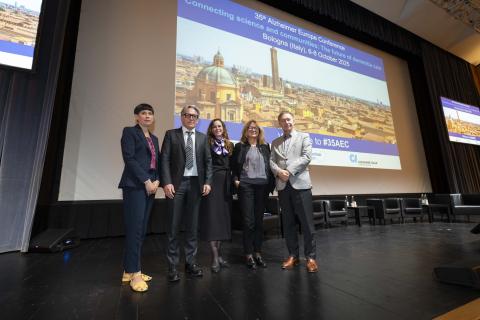
The third plenary of the conference focused on preparing for new AD treatments and took the form of a roundtable discussion, moderated by Angela Bradshaw, Director for Research at Alzheimer Europe. The panel included Joanne Pike, Alzheimer Association (USA), Sabina Capellari, University of Bologna (Italy), Lutz Frölich, Central Institute for Mental Health, Mannheim (Germany), and Marco Bozzali, University of Turin (Italy).
The introduction of disease-modifying therapies is a landmark moment in the history of Alzheimer's care, but it also requires a timely and accurate diagnosis, a continuous monitoring system to assess treatment efficacy and safety, as well as improved access to biomarkers through standardised pathways. The ability to identify patients at an early stage has improved, but issues remain with late diagnosis and underdiagnosis,a need for training and upskilling, the need to adapt healthcare systems to new treatments, and to invest in diagnostics, harmonise policies and raise public awareness.
Joanne Pike, reflecting on experiences from lecanemab rollout in the US, highlighted the Association’s ECHO telementoring programme for healthcare professionals, saying “Strong infrastructure is needed for equitable delivery. But capability is also important; physicians must have skills and knowledge, supported by robust guidelines and models of care.” Alongside comments from members of the European Working Group of People with Dementia, and the European Dementia Carers Working Group, the panel discussed questions such as how to improve timely diagnosis, whether European health systems are ready for the introduction of new treatments, what role there might be for genetic counselling, and how to ensure safe monitoring of side effects. The plenary finished with a call to policymakers, to “get serious about dementia,” to ensure strong, sustained investment in health systems, so people who could benefit from treatment can access new AD medicines in a timely, safe and equitable way.
Alzheimer Europe would like to extend a warm welcome to all delegates and remind everyone to use the hashtag #35AEC to join/follow the conversation on our social media channels (Live posting on X, daily posting on BlueSky, Facebook, Instagram and LinkedIn)
Acknowledgement
Alzheimer Europe gratefully acknowledges the support of all conference sponsors, with particular thanks to Gold sponsor Lilly, Silver sponsor Bristol Myers Squibb, and Bronze sponsors, BioArctic, Biogen, Eisai, Johnson & Johnson, MSD, Novo Nordisk, Roche and UCB.
For further information, contact:
Jean Georges, Executive Director, Alzheimer Europe, 5, Heienhaff, L-1736 Luxembourg, Tel.: +352-29 79 70, Fax: +352-29 79 72, jean.georges@alzheimer-europe.org, www.alzheimer-europe.org
Notes to editors:
Alzheimer Europe is the umbrella organisation of national Alzheimer associations and currently has 41 member organisations in 36 European countries.
The European Working Group of People with Dementia (EWGPWD) was launched by Alzheimer Europe in 2012. It is composed entirely of people with dementia, nominated by their national Alzheimer associations. They work to ensure that the activities of Alzheimer Europe reflect the priorities and views of people with dementia. The group operates independently, and the Chairperson is also an ex-officio member on the Board of Alzheimer Europe with full voting rights. (/www.alzheimer-europe.org/Alzheimer-Europe/Who-we-are/European-Working-G…)
The European Dementia Carers Working Group (EDCWG) was launched by Alzheimer Europe and its member associations in 2022. It is composed of current carers, relatives and supporters of people with dementia or carers with prior experience of caring in the 5 years prior to their nomination by their national Alzheimer associations. They work to ensure that the activities, projects and meetings of Alzheimer Europe duly reflect the priorities and views of people caring for a person with dementia. The group operates independently, and the Chairperson is also an ex-officio member on the Board of Alzheimer Europe with full voting rights. (https://www.alzheimer-europe.org/about-us/european-dementia-carers-work…)
INTERDEM is a pan-European network of researchers collaborating in research on and dissemination of Early, Timely and Quality Psychosocial Interventions in Dementia aimed at improving the quality of life of people with dementia and their supporters, across Europe (http://interdem.org/).
